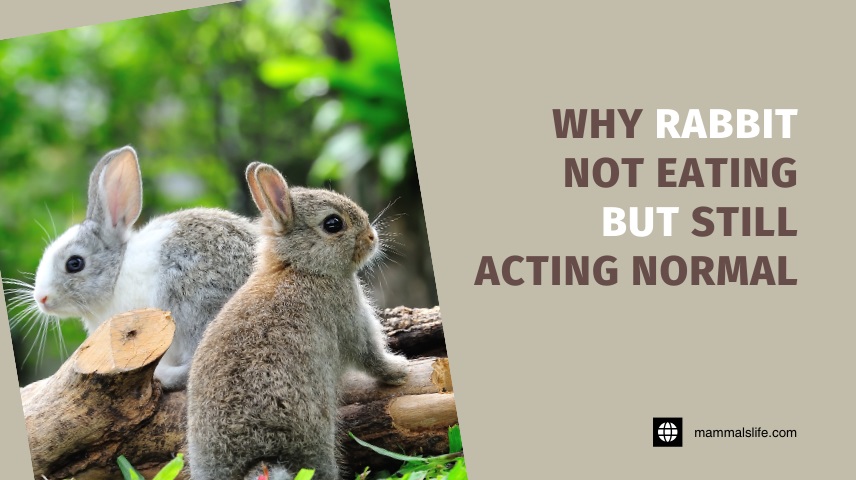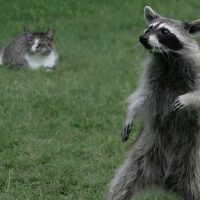Last Updated on February 22, 2025 by Mammals Life
A rabbit not eating but acting normally may have dental issues or gastrointestinal stasis. Consult a vet immediately.
Rabbits are usually enthusiastic eaters. If a rabbit stops eating but seems otherwise normal, it raises concerns. Dental problems are a common cause. Overgrown teeth can make chewing painful. Gastrointestinal stasis, a potentially life-threatening condition, may also be responsible. This condition slows down or stops the movement of food through the digestive system.
Stress, dehydration, or a poor diet can trigger it. Immediate veterinary attention is crucial to diagnose the problem accurately. Early detection and treatment can prevent serious health issues. Always monitor your rabbit’s eating habits and general behavior closely. Regular check-ups ensure your pet stays healthy and happy.
Why Is My Rabbit Not Eating But Still Acting Normal
It’s alarming when your rabbit stops eating but still seems to be acting normal. Understanding why this happens is crucial for their health. Let’s explore the possible reasons behind this behavior to ensure your furry friend stays healthy and happy.
Gastrointestinal Problems
Gastrointestinal issues are common in rabbits and can cause them to stop eating. Even if they appear normal, they might be experiencing discomfort. Look out for:
- Changes in droppings
- Reduced appetite
- Lethargy
Here’s a table to help you identify gastrointestinal problems:
| Symptom | Description |
|---|---|
| Small or misshapen droppings | Indicates slow gut movement |
| Absence of droppings | Possible blockage |
Always ensure your rabbit has access to fresh hay, which aids digestion. Monitor their droppings regularly and consult a vet if you notice any abnormalities.
Dental Issues
Dental problems can also lead to a loss of appetite in rabbits. Their teeth grow continuously, and improper alignment can cause pain. Signs of dental issues include:
- Drooling
- Difficulty chewing
- Weight loss
Regularly check your rabbit’s teeth. Long or misaligned teeth might need trimming by a vet. Provide chew toys to help wear down their teeth naturally.
Stress Or Environmental Changes
Stress can significantly impact a rabbit’s eating habits. Changes in their environment or routine can cause anxiety. Common stressors include:
- New pets or people
- Noise and sudden movements
- Change in habitat
Create a calm and quiet environment for your rabbit. Maintain a consistent routine and provide hiding spots where they can feel safe. Observe their behavior and adjust their surroundings to reduce stress.
Food Preferences Or Picky Eating
Rabbits can be picky eaters. They may refuse food they don’t like while appearing normal otherwise. Try the following tips:
- Introduce new vegetables gradually
- Mix different types of hay
- Observe their preferences
Offer a variety of healthy foods to find what they enjoy. Avoid sudden changes in diet, as this can upset their stomach. Keep track of their favorite foods and include them in their diet regularly.
Mild Dehydration
Mild dehydration can cause a rabbit to stop eating. Ensure they have access to clean, fresh water at all times. Signs of dehydration include:
- Dry mouth
- Sunken eyes
- Reduced skin elasticity
Provide water in both a bowl and a bottle to encourage drinking. You can also offer water-rich vegetables like cucumber and lettuce to help keep them hydrated.
Seasonal Or Hormonal Changes
Seasonal or hormonal changes can affect a rabbit’s appetite. During breeding seasons, their eating habits might change. Signs include:
- Increased or decreased appetite
- Behavioral changes
- Weight fluctuations
Monitor their weight and behavior during these times. Ensure they have a balanced diet to support their changing needs. Consult a vet if you notice any drastic changes.
Hidden Illness Or Early Warning Signs
Sometimes, a rabbit might stop eating due to hidden illnesses or early warning signs. Even if they seem normal, underlying issues could be present. Watch for:
- Subtle changes in behavior
- Minor weight loss
- Unusual droppings
Regular vet check-ups can help catch these issues early. Keep a close eye on any changes in their habits and seek veterinary advice if you suspect something is wrong.
When To Seek Veterinary Help
If your rabbit stops eating for more than a day, it’s time to seek veterinary help. Even if they appear normal, prolonged lack of appetite can lead to severe health issues. Contact a vet if you notice:
- No droppings for 12 hours
- Signs of pain or discomfort
- Continuous weight loss
Early intervention is key to preventing serious health problems. Your vet can provide a thorough examination and recommend appropriate treatment. Don’t wait too long; your rabbit’s health depends on timely care.
Frequently Asked Questions
Why Is My Rabbit Not Eating But Active?
Rabbits may stop eating due to dental issues, stress, or gastrointestinal problems. Consult a vet for a proper diagnosis.
Can Stress Cause A Rabbit To Stop Eating?
Yes, stress can cause rabbits to stop eating. Changes in environment or routine may trigger this response. Monitor their behavior closely.
What Should I Do If My Rabbit Won’t Eat?
Check for signs of illness or dental problems. Offer fresh hay and water. Contact a vet if the issue persists.
Is It Normal For Rabbits To Skip Meals?
No, rabbits should eat consistently. Skipping meals could indicate an underlying health issue. Seek veterinary advice if this happens.
How Can I Encourage My Rabbit To Eat?
Offer favorite treats like leafy greens or herbs. Ensure a stress-free environment. Consult a vet if needed.
What Are Signs Of Dental Problems In Rabbits?
Watch for drooling, difficulty chewing, or food refusal. Dental issues are common in rabbits and require veterinary care.
Conclusion
It’s crucial to monitor your rabbit’s eating habits closely. Even if they seem normal, a sudden change in appetite can signal health issues. Consult a vet to ensure your pet’s well-being. Proper care and attention can prevent serious problems. Keep your rabbit healthy and happy with regular check-ups and a balanced diet.








